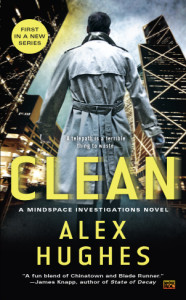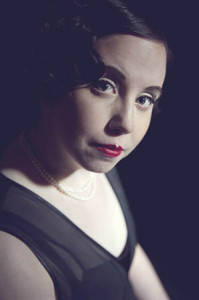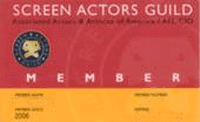 Last week, we started our interview with Alex Hughes, author of the Mindscape series that starts with Clean. Clean is one of the best books I’ve read this year and I recommend you buy and read it immediately.
Last week, we started our interview with Alex Hughes, author of the Mindscape series that starts with Clean. Clean is one of the best books I’ve read this year and I recommend you buy and read it immediately.
Seriously, follow that link to Amazon and buy the thing before reading the rest of the interview. I’ll wait.
Got it?
Good.
Here’s the rest of the interview.
4. Could you talk a bit about why you opted for a traditional publisher as opposed to indie or self-publishing?
Back when I was trying to get into the writing world originally self-publishing wasn’t a real option. It was the mid- to late nineties and the traditional publishers were the only game in town. I dreamed of walking into my big-box Barnes & Nobles and seeing my book there. A decade later, my husband and I were beginning to talk about self-publishing when I got the call. I knew that I was finally ready, but as it happened the publisher called me first. I’m still incredibly honored and proud to visit my book at the bookstore, and my publisher has been a partner I’m proud to work with. But there are still many options out there.
5. What’s next for Alex Hughes, and for Adam?
Alex is currently working on book #4 in Adam’s world, where Adam is called in on an FBI case outside of Atlanta. There’s a short story in the world I’ll release sometime in the next few months as well. I’ve also got a few fun projects I’m working on, which include both a novel in another world on my own, and a collaboration project with Kerry Schafer, one of my writing partners. I’ve recently had stories accepted into the Thunder on the Battlefield anthology and The Sea anthology, and had my first invite to an invitation-only anthology, which was a huge personal milestone. What’s next? I try new things and be creative. I *love* this stuff, and I love the readers. They’re awesome, and I want to keep them happy.
6. What question do you wish more people asked you?
Well, I used to wish people didn’t ask about pets. I don’t have actual pets (hubbie is violently allergic), and they treat me funny when I talk about my imaginary cat. But lately, I’ve been considering a small dragon. So I like the question a lot. People like to weigh in on my dragon choice.
I also wished more people asked about my super nerdy academic obsessions. For some reason, that’s not a common cocktail party question, go figure.
7. What’s the answer to that question?
Ooooh! Thanks for asking! I was a history major in college, and I *love* early modern European history, especially social and cultural history. Reading about people who thought and acted differently from anyone I’ve ever met… well, it makes my brain happy. War of the Three Henries? Best named war ever. Plus Cardinal Richeleu was just as conniving in history as he is in the Three Musketeers by Dumas. Oh, I am a major biology nerd. And physics. And brain and behavior. Ask me about The Man Who Mistook His Wife for a Hat. And brain surgery. And historical plastic surgery–definitely ask me about that! Or don’t… I can go on for awhile. 🙂
</nerdrant>
8. Tell us about any appearances or new books coming in the next few months, so we can all mark our calendars.
Book #3 in the Mindspace Investigations series is called Marked, and it’s out in April. (Already available for preorder!) Book #4 should be out end of 2014.
I’ll be at the Georgia Literary Festival in November, Costal Magic Convention in February 2014, and Dahlonega Literary Festival in March. (All reader events – come say hi 🙂 )
And like I said, I’m currently working on a few extra projects, so stay tuned for those sometime next year or so.
Thanks again, Alex. This has been fun. Fans with questions for Alex should contact her via her website, or leave comments below. I’ll make sure she gets them.





